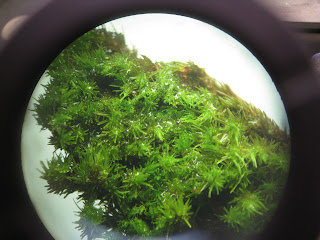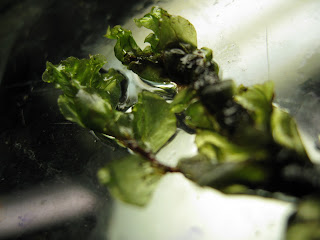Sunday, January 16, 2011
Fissidens bryoides
- commonly grows on rocks
- can see the sporophyte in the first picture
- one capsule is open & you can see the red, toothed peristome
- red spores can be seen by shining light on the capsule
Dicranum viride
- "viride" coming from the Latin word for green
- found commonly growing on trees
- leafs tips are very fragile, come off easily
Dicranum undulatum
This specimen did not preserve well, but hopefully these pictures are still helpful!
- undulate (wavy) leaves
- tomentose [wooly, densely radiculose (covered with rhizoids)]
Brotherella recurvans
- secund (turned to one side) leaf tips
- stem & branch leaves similar
- very shiny, green, yellow, or golden plants
- plant typically has flattened appearance
- inflated alar (basal) cells:
- about 4-8 cells at the basal angles conspicuously inflated and yellowish in a single transverse row, with 1-2 or more rows of moderately inflated, usually hyaline (colorless & transparent) cells above them
Diphyscium foliosum
Commonly referred to as "Rabbit-in-the-Grass", this cute little moss is one of my favorites!
- awn coming up from costae of leaves
- toothed peristome on sporophyte, which is very inflated
Orthotrichum anomalum
Branch leaves:
- costa ending slightly below the apex
- upper leaf cells
- fairly straight rows
- irregularly rounded-hexagonal
- incrassate (thickened)
- pluri-papillose on both surfaces
- lower (basal) leaf cells
- rectangular, smooth, pale; somewhat incrassate
Subscribe to:
Comments (Atom)






































